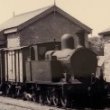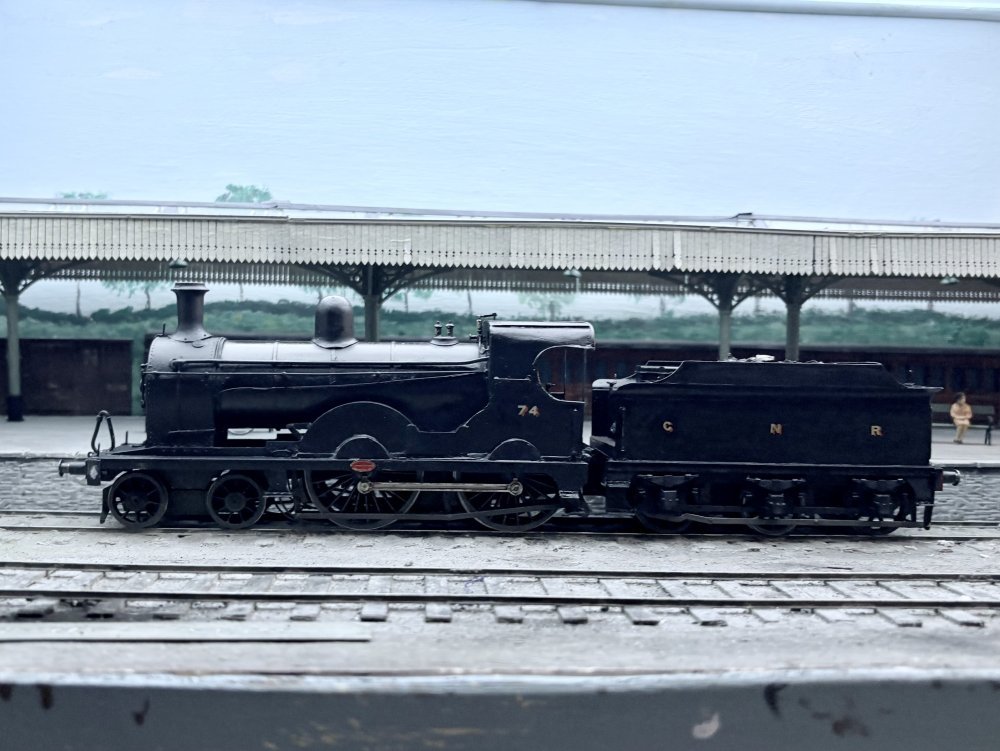-
Posts
4,642 -
Joined
-
Last visited
-
Days Won
59
Content Type
Profiles
Forums
Events
Gallery
Everything posted by Galteemore
-
A request for an Irish layout at a local show has got me thinking, and creating. Desiderata : The layout has to be small and light Allow continuous running Opportunity to try out new techniques. Irish in gauge ...just couldn’t bring myself to ignore the gauge issue! I decided to try narrow gauge as I’ve been drawn that way of late in recent book purchases. That just left the choice of scale/gauge. 7mm is too big for a 2nd layout. So 4mm ? 12 mm motor bogies etc are rather hard to pick up right now so that’s out. A chance visit to Shapeways suggested TTn3. 3mm scale, 3’ gauge on 9mm track.... Scenario will be based on one of the 19th century schemes to link the Clogher Valley with the Cavan and Leitrim. Final layout plan awaits decision but it will have a roadside tramway feel, set in Leitrim, with CV/C& L stock mingling. Small station with a hamlet nearby. Early work includes a small diorama to test ideas and a scratch built wagon. All a bit crude but still getting my eye in. The size comparators may garner some sympathy I hope! More updates to follow.
- 24 replies
-
- 10
-

-

-

-
Excellent. Should be well pleased with that
-
Nice view of a diesel brake tender too
-
It’s there - just keep looking down the page
-
Lovely modelling David - and bringing some unusual prototypes to life !
-

Ernies Massive Irish 1930's to 2005 Photo Archive
Galteemore replied to Glenderg's topic in Photos & Videos of the Prototype
Interesting Ernie. Presumably that’s 5T on her way to the USA? -
That is incredible workmanship all round. These are exquisite. What thickness are the sides of the open, Angus?
-
Lovely shot. But if I saw that view at c0755 it meant I’d missed the train to school! Can’t have been long after Downshire was rebuilt from the original cinder platform and corrugated shelter
-
5mm actually, I think. That’s certainly what Johnson and O’Rourke’s book says. See also... http://micksrovingreporter.blogspot.com/2011/04/weekend-in-donegal-23-24-may-2009.html?m=1 https://get.google.com/albumarchive/112461785190797901174/album/AF1QipOlcL7V3TY1kIN0Paiy7bNdnSZH5qarJor-vWNj
-
Indeed - as seen here :https://www.rte.ie/archives/2017/0228/856104-when-donegal-had-a-railway/ The video also gives a rare view of 85 Merlin inside the museum before restoration - still filthy from UTA withdrawal! I can just remember seeing here like that. I saw Sam’s layout once, also c1978. 5.5 gives a bit of a volume advantage over 4mm work - a bit more space inside the loco and slightly easier for adding detail! Some S scale bits and pieces may be of use as close enough in scale. OOn3 is a little harder to start off in nowadays as TT scale motor plants such as Halling are much harder to source at the moment.
-
This is a little gem. Lots of good tips like the curved backscene.
-
That is just terrific. Small incidentals like the overhead wiring just add so much here.
-
Inset track and subtle colouring look very good
-

1/32 Scale Mountfleet Round Table Minesweeper
Galteemore replied to Georgeconna's topic in Aviation & Maritime Modelling
That’s lovely work George. Very fine and looks like it would actually work ! -
They are terrific. One of the ‘tests’ of a model railway is how identifiable it is with all the rolling stock removed..,,your layout clearly says GNR.
-
That’s looking really effective. Shades of New Ross c 1980
-
That’s hilarious Jb. You can imagine the narrative I grew up with from the 70s onwards re financing Irish preservation, and the need to actually pay for the trains that one liked to photograph.....
-
Great stuff Angus. Nice to see it coming to life again!
-

Anyone in the market for some full size toys?
Galteemore replied to irishthump's topic in General Chat
That can’t have helped, but it seems to have been their contract engineering business that dragged them down. Read the Patriot new-build forum to see what kind of work the Llangollen chaps had been churning out - it wasn’t always top notch to put it mildly -
That’s a fine job indeed that he’s done. Should be well pleased with that. Good old fashioned make it yourself modelling.
-
Very nice indeed. Shows what’s possible in a small space
-
-
One of the most interesting aspects of Eire’s rather odd neutrality. There was, strictly speaking, no need to make the signs distinct from one another by numbering them. All that was required was the national name to discourage overflight. If you had a chart with the numbers on them, as the RAF did, it wouldn’t simply tell you that you were over Eire, but also exactly where over Eire you were..... DeV and Churchill’s public spat in 1945 concealed a great deal of subtle co-operation.
-

Classified: 7mm scale 36.75mm gauge Ivatt F6 2-4-2T
Galteemore replied to Galteemore's topic in For Sale or Wanted
Thanks Ken. That’s the only part of the scene that was bought in and isn’t home made- it’s a Marcway crossover! I’m selling the F6 to pay for another tank, which I think you will like
.png.c363cdf5c3fb7955cd92a55eb6dbbae0.png)






